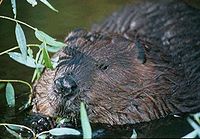
Photo from wikipedia
Antagonistic interactions among different functional guilds of nematodes have been recognized for quite some time, but the underlying explanatory mechanisms are unclear. We investigated responses of tomato (Solanum lycopersicum) to… Click to show full abstract
Antagonistic interactions among different functional guilds of nematodes have been recognized for quite some time, but the underlying explanatory mechanisms are unclear. We investigated responses of tomato (Solanum lycopersicum) to two functional guilds of nematodes - plant parasite (Meloidogyne javanica) and entomopathogens (Heterorhabditis bacteriophora, Steinernema feltiae belowground, and S. carpocapsae) - as well as a leaf mining insect (Tuta absoluta) aboveground. Our results indicate that entomopathogenic nematodes (EPNs): 1) reduced root knot nematode (RKN) infestation belowground, 2) reduced herbivore (T. absoluta) host preference and performance aboveground, and 3) induced overlapping plant defense responses by rapidly activating polyphenol oxidase (PPO) and guaiacol peroxidase (GP) activity in roots, but simultaneously suppressing this activity in aboveground tissues. Concurrently, we investigated potential plant signaling mechanisms underlying these interactions using transcriptome analyses. We found that both entomopathogens and plant parasites triggered immune responses in plant roots with shared gene expression. Secondary metabolite transcripts induced in response to the two nematode functional guilds were generally overlapping and showed an analogous profile of regulation. Likewise, we show that EPNs modulate plant defense against RKN invasion, in part, by suppressing active expression of antioxidant enzymes. Inoculations of roots with EPN triggered an immune response in tomato via up-regulated phenylpropanoid metabolism and synthesis of protease inhibitors (PIs) in plant tissues, which may explain decreased egg laying and developmental performance exhibited by herbivores on EPN-inoculated plants. Furthermore, changes induced in the volatile organic compound (VOC)-related transcriptome indicated that M. javanica and/or S. carpocapsae inoculation of plants triggered both direct and indirect defenses. Our results support the hypothesis that plants 'mistake' subterranean EPNs for parasites, and these otherwise beneficial worms activate a battery of plant defenses associated with systemic acquired resistance (SAR) and/or induced systemic resistance (ISR) with concomitant antagonistic effects on temporally co-occurring subterranean plant pathogenic nematodes and terrestrial herbivores.
Journal Title: Molecular ecology
Year Published: 2021
Link to full text (if available)
Share on Social Media: Sign Up to like & get
recommendations!